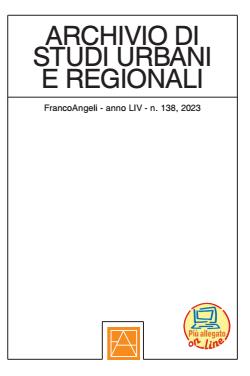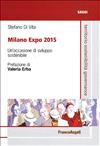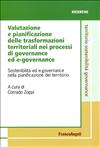
LIBRI DI STEFANO DI VITA


The relationship between mega-events and cities is changing due to growing criticism and delegitimization regarding the increase of investments towards new venues and infrastructures. This contribution argues that it is useful to learn jointly from different types of both sporting and cultural mega-events. For instance, the European Capital of Culture promotes multiple approaches to reusing existing venues and infrastructures, integrating events into the urban fabric, with a more sustainable size and budget compared to Olympics or Expo. The article considers international case studies to discuss the construction of public narratives, governance and spatial visions, and cultural heritage. It critically reflects on the potential of the Milano-Cortina 2026 Olympics to respond to these aspects.


Looking at Italian smart city projects, this article suggests a theoretical reflection about potentials for an innovative regional cohesiveness condition provided by the exploitation of material and immaterial networks. On this occasion, it presents the outcomes achieved by a research project about the Milan-Turin smart region, that aims at implementing smartness not only in main urban nodes, but also in in-between and non-urban spaces, often marginalized. The project outlines a system of Urban Digital Nodes, which (inspired by a ‘human’ a roach) combine traditional and digital services by referring to specific features and needs of single places and of their users. Conclusions highlight the human smartness potentials and challenges at the regional scale, also in relation to the current debate about the Italian national urban agenda

Against the backdrop of the recurring rhetorics and the ongoing scientific debate about the diffusion of ICTs in the urban space, this issue aims at exploring risks and potentials of the smartness in regionalised cities through a collection of international and multidisciplinary research and case studies. Specifically, within the different articles, the issue deals with the regional size of contemporary urban phenomena at different scales: transboundary city-regions (as the international Øresund Region and the interregional Northern Italy’s sector between Milan and Turin); big cities’ metropolitan contexts (of Barcelona, Bilbao, Bristol, Glasgow and Seattle); small and medium towns’ regional networks (in Castilla y Leon, Marche and Veneto)

The article aims at reconstructing the articulated system of actors (and related plans), which have been directly or indirectly involved in the Milan Expo 2015. This analysis is an occasion to reflect about the legacies of large events, and their new role in post crisis urban change and regeneration processes, even in the perspective of the Rome bid for the 2024 Olympics and the organization of the following 2025 Catholic Jubileum.

Nei mesi successivi alla conclusione dell’Esposizione Universale di Milano 2015, l’articolo propone un’esplorazione delle ricadute territoriali della manifestazione, contribuendo alla riflessione in corso sulla capacità dei grandi eventi di continuare ad essere fattori di cambiamento urbano nella fase di incertezze economiche, politiche e sociali determinate dall’attuale congiuntura. Considerando sei temi - grandi infrastrutture, accessibilità/spazio pubblico, coinvolgimento/visibilità, legacy culturale, innovazione tecnologica e stato di eccezione - e osservando gli effetti territoriali dell’evento nel breve periodo, vengono riconosciuti sia gli aspetti critici, sia gli elementi di innovazione, che hanno caratterizzato l’esperienza milanese e che potrebbero influenzare il futuro sviluppo, sia del sito espositivo, sia della regione metropolitana


In una fase in cui si stanno pubblicando i primi bilanci dell’Expo 2015 e si stanno lentamente configurando le proposte di trasformazione e valorizzazione post-evento del sito espositivo, il servizio raccoglie le riflessioni sulle differenti forme di legacy territoriale della manifestazione, proposte da alcuni studiosi che hanno osservato le fasi di organizzazione, realizzazione e celebrazione dell’evento e di pianificazione del post-evento da diversi punti di vista, interni o esterni al processo

Un'occasione di sviluppo sostenibile
A partire dal caso Expo Milano 2015, il testo esplora il tema dei mega eventi attraverso i principi dello sviluppo sostenibile. In particolare esplora le esternalità positive e negative indotte dai grandi eventi, e riflette sulle possibilità di promuovere uno sviluppo urbano realmente sostenibile attraverso i grandi eventi.
cod. 1786.1.2

The global crisis is highlighting the limitations of the relationships, not to be taken for granted, between major events and urban and regional development. The difficulties so far encountered in these relationships in Milan in the run up to the 2015 Expo are quite significant. Analyses of the progress of the projects and the acquisition of opinions from leading protagonists of local institutions provide an update on the strengths and weaknesses of this major Milan event, drawn for previous editions of the Forum. At the same time they identify some of the potential for the renewal of traditional urban development models in major events, seen in terms of their regional metropolitan dimension.

Sostenibilità ed e-governance nella pianificazione del territorio
La VAS porta a un radicale cambiamento nella prassi della pianificazione urbanistica, ma, come ogni radicale cambiamento, difficilmente può diventare prassi reale in breve tempo. Questa tensione al cambiamento difatti si scontra in Italia con una prassi del “fare i piani” in cui la valutazione non trova grande spazio e grande considerazione in termini di utilità ed efficacia…
cod. 1786.2.2




Milan towards Expo 2015 - On 31st March 2008, the City of Milan was selected for the 2015 Universal Exposition on the basis of a candidature dossier which illustrates ambitious projects which have the declared intention of making the regional Lombard capital a model of sustainable development, with a particular focus on the environment. The essay therefore seeks to examine development programmes for the Italian metropolis produced in view of the Expo, in order to underline not only its virtuous intentions, but also some of its contradictions with particular attention paid to potential environmental and social side-effects. It is a careful analysis, performed by considering a series of sub-issues with constant reference made to the experiences of some European cities that have recently hosted his major event in order to offer ideas for possible alternatives.


